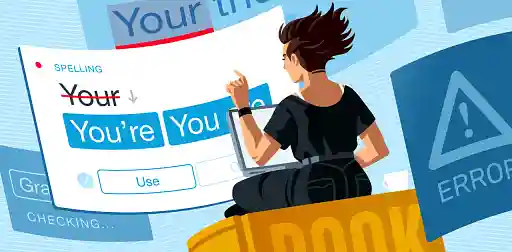Posted on Jun 19, 2024
450+ Powerful Adjectives to Describe a Person (With Examples)
About the author
Reedsy's editorial team is a diverse group of industry experts devoted to helping authors write and publish beautiful books.
More about the Reedsy Editorial Team →Isabella Peralta
A writer and editor, Isabella coordinates "Prompts," Reedsy's weekly short story competition. Originally from the Philippines, she is a graduate of the University of Cambridge.
View profile →No matter what you’re writing, whether that be a heartfelt memoir, a thrilling whodunit, or a page-turning romantasy series, you’ll need a reliable list of adjectives to bring your characters to life. These illustrative words can aid your readers in forming a multifaceted, intriguing image of the heroes and villains gracing your pages.
In this post, we’ll share over 450 adjectives you can use to describe a character’s physical attributes, disposition, and emotional state. Read on to find out what they are!
What is an adjective?
Before we list all the adjectives you can use to enrich your writing, let’s quickly review what they are and why they matter.
An adjective is a word that describes people, places, things, and ideas. Authors use adjectives all the time — in fact, choosing the right adjective can make all the difference in your own writing. Take a look at the following lines:
“His school jacket of cloth with buttons must have been tight about the arm-holes… His legs, in stockings, looked out from beneath trousers… He wore boots.”
Now, let’s add a few adjectives to this sentence:
“His short school jacket of green cloth with black buttons must have been tight about the arm-holes… His legs, in blue stockings, looked out from beneath yellow trousers… He wore stout, ill-cleaned, hob-nailed boots.”
This excerpt comes from Gustave Flaubert’s classic novel Madame Bovary. The adjectives here help to paint a more vivid image of the character Charles Bovary: first, by showing that he has a horrible sense of style, and second, by hinting that he might belong to a poor family.
Adjectives, therefore, help to develop a richer narrative and are an essential part of character development.
While there are countless adjectives that can be used to describe both living creatures and inanimate objects, we’ll focus on those that can paint a picture of a character’s appearance and inner world.
Physical adjectives
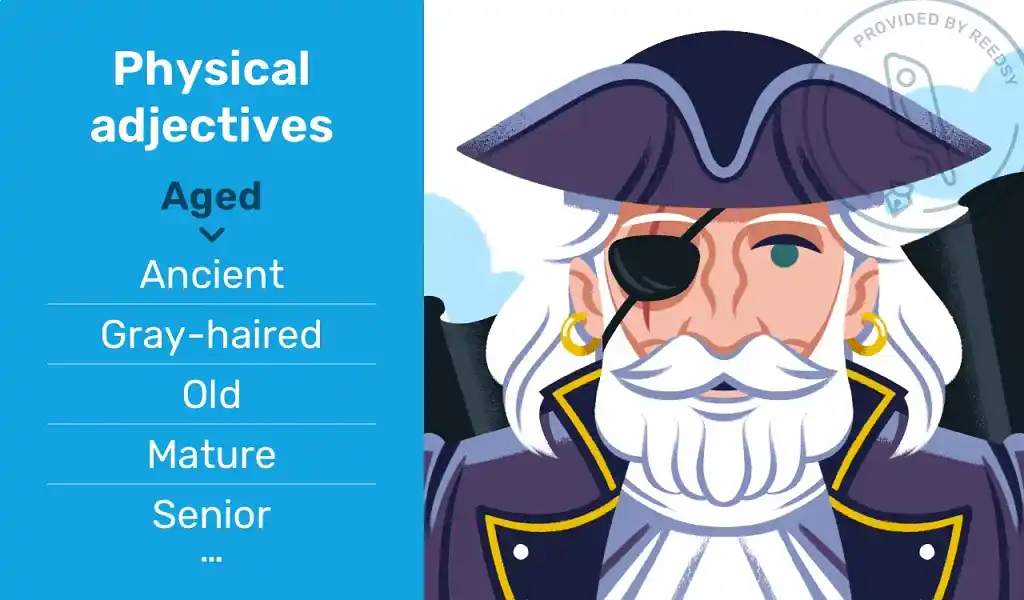
If asked to describe a fictional character with an unforgettable appearance, what would you say? Would you talk about a grotesque character with yellow skin, black lips, and a shriveled complexion, like Frankenstein’s monster? How about a gorgeous, golden-haired swordsman with a missing right hand, à la Jamie Lannister?
One way to make your own characters stand out to your readers is by giving them memorable physical characteristics. Use the words below to inform your readers of your character’s outer appearance. In addition to their eye and hair color, how else can you describe them?
|
Trait |
Other Adjectives | ||
|
Handsome |
Attractive |
Fetching |
Pretty |
|
Beautiful |
Good-looking |
Striking |
|
|
Dashing |
Gorgeous |
Stunning |
“Emma Woodhouse, handsome, clever and rich, with a comfortable home and happy disposition, seemed to unite some of the best blessings of existence and had lived nearly twenty-one years in the world with very little to distress or vex her." – Jane Austen, Emma
|
Ugly |
Displeasing |
Hideous |
Unattractive |
|
Ghastly |
Repulsive |
Unpleasant |
|
|
Grotesque |
Revolting |
Unsightly |
“I had gazed on him while unfinished; he was ugly then, but when those muscles and joints were rendered capable of motion, it became a thing such as even Dante could not have conceived.” — Mary Shelley, Frankenstein
|
Plain |
Average |
Mediocre |
Plain-looking |
|
Forgettable |
Ordinary-looking |
Unexceptional |
|
|
Homely |
Plain-featured |
Unremarkable |
“The worst of Bath was the number of its plain women. He did not mean to say there were not pretty women, but the number of the plain was out of all proportion.” – Jane Austen, Persuasion
|
Aged |
Ancient |
Gray-haired |
Old |
|
Centenarian |
Mature |
Senior |
|
|
Elderly |
Nonagenarian |
Wrinkled |
“In his aged face under great snowy brows his eyes were set like coals that could suddenly burst into fire.” – J.R.R. Tolkien, The Fellowship of the Ring
|
Young |
Adolescent |
Girlish |
Teenaged |
|
Boyish |
Immature |
Underage |
|
|
Childlike |
Juvenile |
Youthful |
“Young people, nowadays, imagine that money is everything.” – Oscar Wilde, The Picture of Dorian Gray
|
Tall |
Colossal |
Gigantic |
Monstrous |
|
Gangling |
Long-legged |
Towering |
|
|
Giant |
Massive |
Statuesque |
“He was a very tall, thin man, with a long nose like a beak, which jutted out between two keen gray eyes, set closely together and sparkling brightly from behind a pair of gold-rimmed glasses.” – Arthur Conan Doyle, The Hound of the Baskervilles
|
Short |
Diminutive |
Pint-sized |
Stubby |
|
Little |
Short-legged |
Teeny |
|
|
Petite |
Small |
Tiny |
“He was a man of about five and thirty, short, stout even to corpulence, and clean shaven.” – Fyodor Dostoevsky, Crime and Punishment
|
Sophisticated |
Chic |
Elegant |
Regal |
|
Dapper |
Majestic |
Stately |
|
|
Dignified |
Noble |
Stylish |
“He thinks himself rather an exceptional young man, thoroughly sophisticated, well adjusted to his environment, and somewhat more significant than any one else he knows.” – F. Scott Fitzgerald, The Beautiful and Damned
|
Feeble |
Decrepit |
Frail |
Unwell |
|
Delicate |
Infirm |
Wan |
|
|
Doddering |
Sickly |
Weak |
“I am so miserable, there are so many questions, I can see no way out and am so wretched and feeble that I could lie forever on the sofa and keep opening and closing my eyes without knowing the difference.” – Franz Kafka, Letters to Felice
|
Muscular |
Athletic |
Fit |
Robust |
|
Brawny |
Herculean |
Strong |
|
|
Burly |
Powerful |
Sturdy |
“They’re just as muscular here, just as tramplingly extraverted, as they are with you.” – Aldous Huxley, Island
|
Stout |
Big |
Large |
Plus-size |
|
Chubby |
Overweight |
Pot-bellied |
|
|
Heavy |
Plump |
Portly |
“Perry, the manager, had come up with him, in trousers and bathrobe. He was a stout, jovial-looking man ordinarily…” – Cornell Woolrich, Mystery in Room 913
|
Thin |
Angular |
Scrawny |
Slim |
|
Bony |
Skinny |
Underweight |
|
|
Lean |
Slender |
Willowy |
“He was tall, thin, and bony; and his hair was red beneath the black cap. His face was crumpled and freckled, and ugly without silliness.” — William Golding, Lord of the Flies
Next, let’s look at some adjectives you can use to describe the way your characters act or respond to another character or a particular situation.
Q: What are effective adjectives for describing characters, and when should each be used?
Suggested answer
My favourite from my writing has been "etiolated." It's a word that describes a seedling starved of sunlight - thin and pale and reaching up. It contains a lot of layers of imagery which were useful for describing a character at their lowest point.
Mairi is available to hire on Reedsy ⏺
Curious, rebellious. A character that doesn't quite "fit the mold" will usually be interesting to readers.
Melody is available to hire on Reedsy ⏺
Characters are best described through body language and dialogue. Avoid overusing adjectives and let your readers do some of the interpreting. There is no need to spell everything out for them. The best way to convey a character's personality is through action, dialogue and body language.
Eva maria is available to hire on Reedsy ⏺
Behavioral adjectives
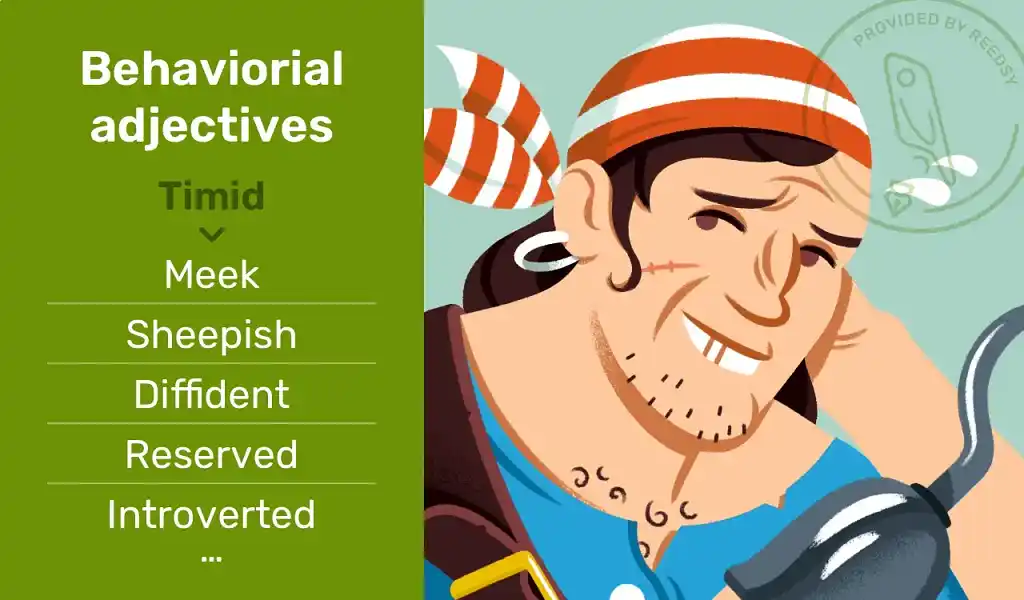
Adjectives that describe behavior often fall into two camps: positive ones, which we tend to reserve for heroes, and negative ones, which we associate with villains. That being said, well-written characters are complex, and often have mixed traits.
Moreover, characters can and should change as part of their narrative arc. Think Macbeth, a courageous and honorable Scottish general who eventually becomes an ambitious killer. Or Frodo Baggins, who starts off as shy and reserved before morphing into a brave leader over the course of his journey.
So when looking at these behavioral adjectives, also consider how they may fit into your character’s arc.
Positive behavioral adjectives
|
Trait |
Other Adjectives |
||
|
Valiant |
Adventurous |
Dauntless |
Heroic |
|
Bold |
Fearless |
Plucky |
|
|
Courageous |
Gallant |
Valorous |
|
“Defeat is for the valiant. Only they will know the honor of losing and the joy of winning.” – Paulo Coelho, Manuscript Found in Accra
|
Agreeable |
Courteous |
Gracious |
Respectful |
|
Decorous |
Pleasant |
Well-behaved |
|
|
Gallant |
Polite |
Well-mannered |
“He was quite young, wonderfully handsome, extremely agreeable, and to crown the whole, he meant to be at the next assembly with a large party.” — Jane Austen, Pride and Prejudice
|
Sensible |
Analytical |
Logical |
Rational |
|
Cerebral |
Practical |
Realistic |
|
|
Judicious |
Pragmatic |
Reasonable |
“She was sensible and clever; but eager in everything; her sorrows, her joys, could have no moderation.” – Jane Austen, Sense and Sensibility
|
Clever |
Astute |
Intelligent |
Sharp |
|
Bright |
Knowledgeable |
Smart |
|
|
Brilliant |
Quick-witted |
Wise |
“A clever, ugly man every now and then is successful with the ladies, but a handsome fool is irresistible.” – William Makepeace Thackeray, The History of Henry Esmond
|
Patient |
Accommodating |
Long-suffering |
Uncomplaining |
|
Forbearing |
Stoical |
Understanding |
|
|
Forgiving |
Tolerant |
Unexcitable |
“He seemed a sullen, patient child; hardened, perhaps, to ill-treatment.” – Emily Brontë, Wuthering Heights
|
Amiable |
Affable |
Cordial |
Hospitable |
|
Congenial |
Friendly |
Warm |
|
|
Convivial |
Genial |
Welcoming |
“Many showed themselves obliging, and amiable too; and I discovered amongst them not a few examples of natural politeness, and innate self-respect, as well as of excellent capacity, that won both my goodwill and my admiration.” – Charlotte Brontë, Jane Eyre
|
Good-natured |
Benevolent |
Considerate |
Kind |
|
Big-hearted |
Good-hearted |
Nice |
|
|
Compassionate |
Helpful |
Thoughtful |
“He was a mild, good-natured, sweet-tempered, easy-going, foolish, dear fellow.” – Charles Dickens, Great Expectations
|
Eloquent |
Articulate |
Persuasive |
Silver-tongued |
|
Graceful |
Poised |
Smooth-tongued |
|
|
Influential |
Refined |
Well-spoken |
“She sought to be eloquent in her garments, and to make up for her diffidence of speech by a fine frankness of costume.” – Henry James, Washington Square
|
Cheerful |
Buoyant |
Hopeful |
Positive |
|
Cheery |
Lighthearted |
Sanguine |
|
|
Forward-looking |
Optimistic |
Upbeat |
“Really cheerful people are usually the bravest...” – Ernest Hemingway, “The Denunciation”
|
Affectionate |
Adoring |
Caring |
Sweet |
|
Affable |
Devoted |
Sympathetic |
|
|
Amorous |
Loving |
Tenderhearted |
“It was all owing to his too affectionate nature, which craved for admiration.” – J. M. Barrie, Peter Pan
|
Reflective |
Contemplative |
Inward-looking |
Self-analyzing |
|
Insightful |
Meditative |
Self-examining |
|
|
Introspective |
Pensive |
Self-observing |
“She was so quiet. So reflective. And she could erase herself, her spirit, with a swiftness that truly startled, when she knew the people around her could not respect it.” – Alice Walker, The Color Purple
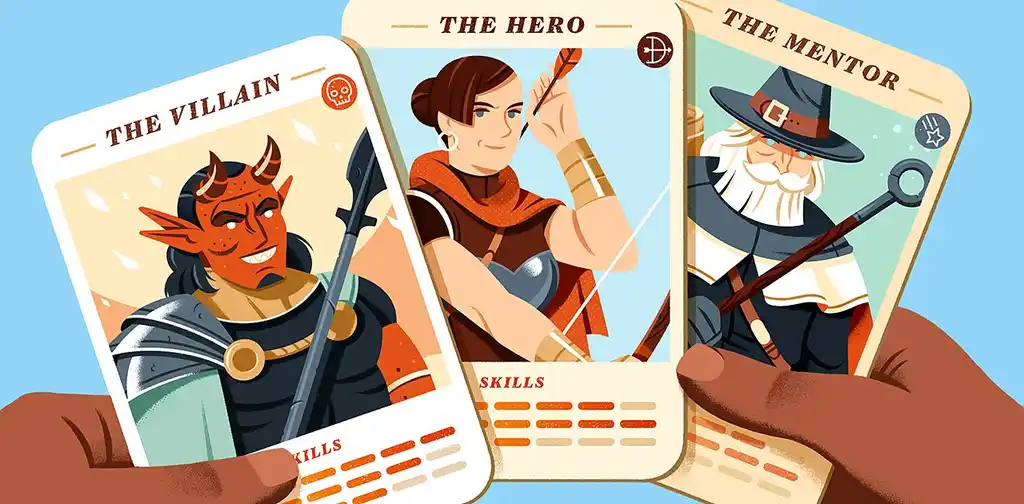
FREE RESOURCE
Reedsy’s Character Profile Template
A story is only as strong as its characters. Fill this out to develop yours.
Negative behavioral adjectives
|
Trait |
Other Adjectives |
||
|
Proud |
Cocky |
Overbearing |
Snobbish |
|
Conceited |
Overconfident |
Smug |
|
|
Haughty |
Pompous |
Supercilious |
|
“He was the proudest, most disagreeable man in the world, and everybody hoped that he would never come there again." – Jane Austen, Pride and Prejudice
|
Mysterious |
Close-mouthed |
Enigmatic |
Taciturn |
|
Discreet |
Inscrutable |
Tight-lipped |
|
|
Evasive |
Secretive |
Uncommunicative |
“Some people maintained that he was a mysterious person, and that no one ever entered his chamber, which was a regular anchorite’s cell, furnished with winged hour-glasses and enlivened by crossbones and skulls of dead men!” – Victor Hugo, Les Misérables
|
Fierce |
Aggressive |
Bellicose |
Defiant |
|
Antagonistic |
Belligerent |
Hostile |
|
|
Argumentative |
Confrontational |
Violent |
“He is not a rough diamond — a pearl-containing oyster of a rustic; he’s a fierce, pitiless, wolfish man." – Emily Brontë, Wuthering Heights
|
Timid |
Bashful |
Meek |
Sheepish |
|
Diffident |
Reserved |
Shy |
|
|
Introverted |
Reticent |
Withdrawn |
“For someone like myself in whom the ability to trust others is so cracked and broken that I am wretchedly timid and am forever trying to read the expression on people's faces.” – Osamu Dazai, No Longer Human
|
Apprehensive |
Doubtful |
Mistrustful |
Self-effacing |
|
Hesitant |
Self-conscious |
Uncertain |
|
|
Insecure |
Self-doubting |
Unconfident |
“They stopped at an oak tree, delighted, puzzled, apprehensive.” – Harper Lee, To Kill a Mockingbird
|
Presumptuous |
Audacious |
Discourteous |
Impolite |
|
Bad-mannered |
Disrespectful |
Impudent |
|
|
Churlish |
Ill-mannered |
Rude |
“I am a private detective. I am paid to be inquisitive and presumptuous.” – Douglas Adams, The Long Dark Tea-Time of the Soul
|
Prickly |
Bad-tempered |
Curmudgeonly |
Irritable |
|
Cantankerous |
Grouchy |
Sensitive |
|
|
Crabby |
Ill-natured |
Surly |
“They all said she was pretentious, awkward, difficult to approach, prickly, too fond of her tales, haughty, prone to versifying, disdainful, cantankerous, and scornful.” – Murasaki Shikibu, The Diary of Lady Murasaki
|
Talkative |
Babbling |
Conversational |
Loquacious |
|
Blathering |
Garrulous |
Rambling |
|
|
Chatty |
Gossipy |
Verbose |
“Like most quiet folks he liked talkative people when they were willing to do the talking themselves and did not expect him to keep up his end of it.” – L. M. Montgomery, Anne of Green Gables
|
Silly |
Brainless |
Idiotic |
Slow-witted |
|
Dense |
Ignorant |
Vapid |
|
|
Foolish |
Mindless |
Witless |
“She’ll not laugh in the sun again. She’ll not dress up and smile at herself in that damnable looking-glass. Vain, silly creature.” — Jean Rhys, Wide Sargasso Sea
|
Odious |
Abhorrent |
Hateful |
Unkind |
|
Despicable |
Horrible |
Vicious |
|
|
Detestable |
Loathsome |
Vile |
“Be gone, odious wasp!” – Norton Juster, The Phantom Tollbooth
|
Tightfisted |
Avaricious |
Parsimonious |
Scroogelike |
|
Close-fisted |
Penny-pinching |
Stingy |
|
|
Miserly |
Penurious |
Ungenerous |
“He was a tightfisted hand at the grindstone, Scrooge!" – Charles Dickens, A Christmas Carol
|
Disillusioned |
Bleak |
Downbeat |
Negative |
|
Cynical |
Fatalistic |
Pessimistic |
|
|
Defeatist |
Hardened |
Skeptical |
“Pitiful is the person who is afraid of taking risks. Perhaps this person will never be disappointed or disillusioned; perhaps she won’t suffer the way people do when they have a dream to follow.” – Paulo Coelho, By the River Piedra I Sat Down and Wept
|
Lethargic |
Idle |
Inert |
Slothful |
|
Indolent |
Languid |
Slow-moving |
|
|
Inactive |
Lazy |
Sluggish |
“The people do not complain because they have no voice; do not move because they are lethargic, and you say that they do not suffer because you have not seen their hearts bleed.” – José Rizal, Noli Me Tángere
|
Impassive |
Aloof |
Detached |
Indifferent |
|
Apathetic |
Dispassionate |
Stoic |
|
|
Cold |
Expressionless |
Unemotional |
“Javert was impassive; his grave face betrayed nothing of his feelings.” – Victor Hugo, Les Misérables
|
Dull |
Bland |
Stodgy |
Unexciting |
|
Boring |
Tiresome |
Uninspiring |
|
|
Charmless |
Uncharismatic |
Uninteresting |
“While he was so dull, it was no wonder that Harriet should be dull likewise; and they were both insufferable.” – Jane Austen, Emma
Okay, that's quite a handful of behavioral adjectives! But since behavior is typically influenced by one’s emotions, that brings us to...
Emotional adjectives
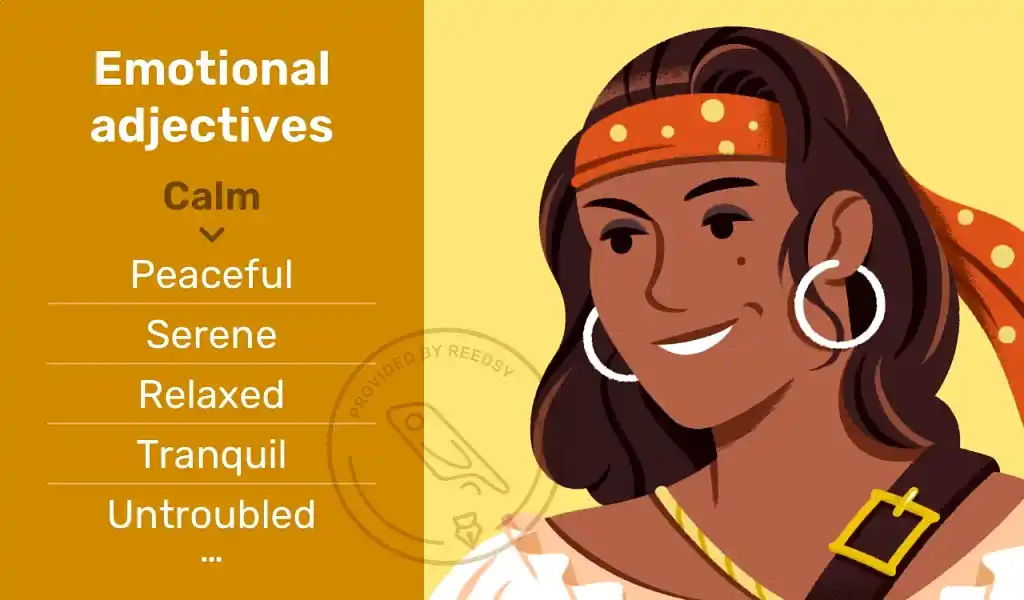
Over the course of a story, a character will experience all kinds of feelings. For example, in Pride and Prejudice, Elizabeth Bennet must come to terms with her growing romantic feelings for Mr. Darcy — a man who initially made her upset due to his arrogant demeanor — as she learns about his true generous nature. In Wuthering Heights, Cathy Earnshaw feels intense, passionate love for Heathcliff, only to become jealous and unhappy because of his cruel, manipulative nature.
Making your characters grapple with conflicting or overwhelming emotions can help readers find them not only more realistic, but also more relatable. So let’s look at some ways you can describe their inner landscape.
|
Trait |
Other Adjectives |
||
|
Angry |
Enraged |
Infuriated |
Seething |
|
Furious |
Irate |
Upset |
|
|
Incensed |
Raging |
Wrathful |
|
“She was feeling, thinking, trembling about everything; agitated, happy, miserable, infinitely obliged, absolutely angry." – Jane Austen, Mansfield Park
|
Jealous |
Begrudging |
Desirous |
Malicious |
|
Bitter |
Envious |
Resentful |
|
|
Covetous |
Grudging |
Spiteful |
“When you wake up in the morning, tell yourself: the people I deal with today will be meddling, ungrateful, arrogant, dishonest, jealous and surly.” – Marcus Aurelius, Meditations
|
Unhappy |
Crestfallen |
Glum |
Miserable |
|
Dejected |
Grief-stricken |
Sad |
|
|
Gloomy |
Melancholic |
Sorrowful |
“The best remedy for those who are afraid, lonely or unhappy is to go outside, somewhere where they can be quite alone with the heavens, nature and God.” – Anne Frank, The Diary of a Young Girl
|
Calm |
Peaceful |
Serene |
Unflappable |
|
Relaxed |
Tranquil |
Untroubled |
|
|
Sedate |
Unbothered |
Unperturbed |
“Women are supposed to be very calm generally: but women feel just as men feel; they need exercise for their faculties, and a field for their efforts, as much as their brothers do…” – Charlotte Brontë, Jane Eyre
|
Disgruntled |
Agitated |
Distressed |
Resentful |
|
Annoyed |
Exasperated |
Stressed |
|
|
Cross |
Irritable |
Vexed |
“I could see that, if not actually disgruntled, he was far from being gruntled.” – P.G. Wodehouse, The Code of the Woosters
|
Content |
Appreciative |
Gruntled |
Unworried |
|
Fulfilled |
Pleased |
Satisfied |
|
|
Grateful |
Untroubled |
Thankful |
“If you look for perfection, you'll never be content.” – Leo Tolstoy, Anna Karenina
|
Lively |
Animated |
Energetic |
Exhilarated |
|
Elated |
Enthusiastic |
Spirited |
|
|
Electrified |
Excited |
Thrilled |
“He was by nature a very lively boy and he gradually became popular in Okonkwo's household, especially with the children.” – Chinua Achebe, Things Fall Apart
|
Cheerful |
Beaming |
Happy |
Joyful |
|
Content |
Jocular |
Merry |
|
|
Gleeful |
Jovial |
Radiant |
“She was a cheerful child with a good temper.” — Jane Austen, Northanger Abbey
And there you have it — over 450 adjectives to help bring your characters to life. But don’t stop here! If this post has inspired you to think more deeply about character creation, here are a few extra resources for you to check out:
- 150+ useful character quirks if you’re unsure of whether your character’s traits and habits are too cliché.
- 12 types of characters every writer should know to test your knowledge about character archetypes.
Good luck, and happy writing!


